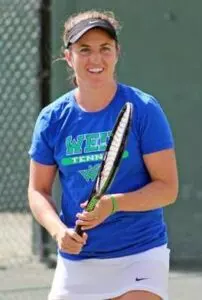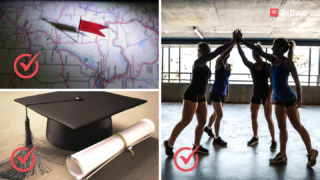Kelly Blackhurst is the Head Coch of the Field Hockey program at the Roger Williams University Athletic Department. Before her position at Roger Williams, she coached at Misericordia.
Coach Blackhurst had numerous accolades in the field hockey world, perhaps most notably being named the D3 Player of the Year in 2013 and breaking a few school records. After graduating from Skidmore, Kelly has begun a career in coaching college field hockey, thus making her a very interesting and well-rounded person to interview about recruiting.
2aDays: How did you go about reaching out to coaches? Was it difficult since you were from a small town?
Coach Blackhurst: I began looking at schools in 9th grade. That may seem early to some people, but I wanted to tour a variety of campuses so I could narrow down my search. At the end of my 10th-grade year, I began contacting college coaches. As I grew up in an isolated town in the northern part of New York State, I needed to put myself out there. Some athletes have the luxury of playing for well-known high schools. My high school team was the furthest north field hockey team in New York. We never made it past the second round of sectionals. Coaches were not going to see me. I had to make myself visible. To be noticed, I attended numerous camps at institutions I was interested in throughout high school, participated in Futures, which was almost three hours away, and joined a club team that was 1.5 hours away. In addition, I attend numerous recruiting events such as College Connection and the National Field Hockey Festival.
2aDays: What was the most challenging part of your recruiting process?
Coach Blackhurst: As I was from a tiny town and mediocre field hockey team, I felt resistance from college coaches. I was an unknown entity. Why would a D1 big-name school want to look at a small-town athlete? Some coaches ignored me entirely while others took the time to get to know me, understand my situation, and create a relationship with me.
Why did you decide to go DIII instead of DI or DII?
Coach Blackhurst: I wanted to play for a highly competitive team and make an impact. I did not want to play for the middle of the road D1 team. Additionally, I wanted to have a full college experience. D3 allowed me to do this. Plus, I was able to play in numerous championship games and compete against other nationally ranked teams. Looking back, I always wonder what life would have been like if I had attended a D1 school. At the end of the day, though, I am glad I made the decision that I did. I received a high-quality education and played for a nationally ranked team.
2aDays: What do you wish you knew while recruiting?
Coach Blackhurst: A couple of questions come to mind that I wish I had asked during my recruiting process.
- How does a coach define success (besides wins)?
- What are the coach's values?
- How does the coach create a good team dynamic?
2aDays: What advice would you give to current high school students looking to play in college?
Coach Blackhurst: Here are some thoughts for the athlete.
- Contact coaches as early as you want. We have athletes contacting us that are in 8th grade. It is never too early to get your name out there.
- When sending emails, make sure that you have spelled everything correctly and included the correct college name. Nothing is worse than receiving an email addressed to another institution.
- Attend as many camps as possible, especially at the schools, you are interested in. This is a great way to visit the campus as well as see your potential future coach in action.
- I visited my alma mater numerous times. I watched at least five games, attended their camp three times as well as their junior day clinic, and went on an official visit where I was able to attend class. These visits allowed me to see how the team interacted, what the coaches' coaching philosophy was, what the parent involvement level was, and what campus was like in the rain and the sun.
- Make sure you like the campus and the campus culture. Schools with Greek life are very different from schools without. What role do you see the team playing as part of your social life in your four years at school?
- Take advantage of as many resources as possible, such as a club or high school coaches and past or current college players.
- Finally, believe in yourself and your capabilities. If you want to play in college, let that be known. Do not shy away because you are a small-town girl no one has heard of. Make a name for yourself, work hard, and make an impact.
Updated: October 29, 2019
* Originally published on July 9, 2015, by Keirsten Sires







